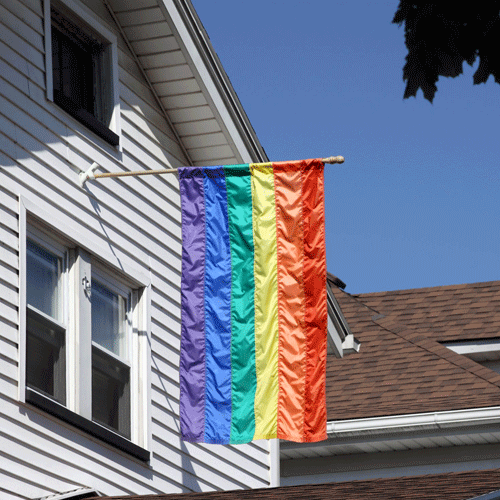Same-Sex Marriage Affirmed in Obergefell v. Hodges

By a vote of 5-4 in Obergefell v. Hodges, the United States Supreme Court held that the Fourteenth Amendment requires a State to license a marriage between two people of the same sex and to recognize a marriage between two people of the same sex when their marriage was lawfully licensed and performed out-of-State.
“The limitation of marriage to opposite-sex couples may long have seemed natural and just, but its inconsistency with the central meaning of the fundamental right to marry is now manifest,” Justice Kennedy stated from the bench. “These considerations lead to the conclusion that the right to marry is a fundamental right inherent in the liberty of the person, and under the Due Process and Equal Protection Clauses of the Fourteenth Amendment, couples of the same-sex may not be deprived of that right and liberty. The Court now holds that same-sex couples may exercise the fundamental right to marry.”
The Facts of the Case
Michigan, Kentucky, Ohio and Tennessee ban same-sex marriage by defining marriage as a union between one man and one woman. Accordingly, they do not grant licenses for same-sex marriage or recognize such unions lawfully performed in other states.
The petitioners, which included 14 same-sex couples and two men whose same-sex partners are deceased, filed suits, alleging that state officials violated the Equal Protection and Due Process Clauses of the Fourteenth Amendment by denying them the right to marry or to have marriages lawfully performed in another state given full recognition. All of the district courts ruled in favor of the same-sex couples. However, the Sixth Circuit Court of Appeals consolidated the cases and reversed.
The Supreme Court agreed to answer the following questions regarding the legality of same-sex marriage: (1) Does the Fourteenth Amendment require a state to license a marriage between two people of the same sex? (2) Does the Fourteenth Amendment require a state to recognize a marriage between two people of the same sex that was legally licensed and performed in another state?
The Court’s Decision
The majority answered yes to both questions, vacating the Sixth Circuit’s decision. Justice Anthony Kennedy authored the majority’s landmark ruling, which Justices Elena Kagan, Ruth Bader Ginsburg, Stephen Breyer, and Sonia Sotomayor joined.
In reaching its decision, the majority confirmed that the right to marry is a fundamental liberty under the Due Process Clause. More importantly, it applies to both opposite-sex and same-sex couples. In support of the fundamental right to marry, the majority noted, “the right to personal choice regarding marriage is inherent in the concept of individual autonomy.” Citing both Griswold v. Connecticut, 381 U.S. 479 (1965) and Lawrence v. Texas, 539 U.S. 558 (2003), the majority also highlighted that the right to marry protects the intimate association between two people unlike any other in its importance to the committed individuals.
In further support of its decision, the majority also maintained that protecting the right to marry safeguards children and families and thus draws meaning from related rights of child rearing, procreation, and education. Justice Kennedy further explained:
Without the recognition, stability, and predictability marriage offers, children suffer the stigma of knowing their families are somehow lesser. They also suffer the significant material costs of being raised by unmarried parents, relegated to a more difficult and uncertain family life. The marriage laws at issue thus harm and humiliate the children of same-sex couples.
The majority also held that refusing to allow same-sex couples to marry and declining to recognize lawfully performed unions violates the Equal Protection Clause. Justice Kennedy eloquently explained:
The challenged laws burden the liberty of same-sex couples, and they abridge central precepts of equality. The marriage laws at issue are in essence unequal: same-sex couples are denied benefits afforded opposite-sex couples and are barred from exercising a fundamental right. Especially against a long history of disapproval of their relationships, this denial works a grave and continuing harm, serving to disrespect and subordinate gays and lesbians.
The Dissent
Chief Justice John Roberts, Jr. authored the main dissent. Justices Antonin Scalia and Clarence Thomas joined, but also wrote separate opinions while Samuel A. Alito, Jr. wrote his own dissent. While the opinions all differed slightly, the dissenters largely asserted that the majority had overstepped by legalizing same-sex marriage, arguing that the states or Congress were in a better position to decide the issue. The dissenting justices also maintained that the majority interpreted the Due Process and Equal Rights Clauses too broadly.
Chief Justice Roberts announced his dissent from the bench, an act traditionally reserved for the strongest dissents. He argued that the majority’s decision “has no basis in the Constitution.” Rather, he asserted that the Court’s ruling “orders the transformation of a social institution that has formed the basis of human society for millennia, for the Kalahari Bushmen and the Han Chinese, the Carthaginians and the Aztecs.”
“But today five lawyers have ordered state to change their definition of marriage,” Roberts stated. “Just who do we think we are? I have no choice but to dissent.”
Previous Articles
SCOTUS Holds No Minimum Contacts Required for Personal Jurisdiction Over Foreign States Under FSIA
by DONALD SCARINCI on October 2, 2025
In CC/Devas (Mauritius) Limited v. Antrix Corp. Ltd., 605 U.S. ____ (2025), the U.S. Supreme Court ...
SCOTUS Sides With Trump Administration Over NIH Grants Tied to DEI Initiatives
by DONALD SCARINCI on September 26, 2025
The U.S. Supreme Court continues to issue emergency orders involving legal challenges to policy cha...
SCOTUS Rejects Challenge to South Carolina’s Exclusion of Planned Parenthood from State Medicaid Program
by DONALD SCARINCI on September 16, 2025
In Medina v. Planned Parenthood South Atlantic, 606 U.S. ____ (2025), the U.S. Supreme Court held t...
The Amendments
-
Amendment1
- Establishment ClauseFree Exercise Clause
- Freedom of Speech
- Freedoms of Press
- Freedom of Assembly, and Petitition
-
Amendment2
- The Right to Bear Arms
-
Amendment4
- Unreasonable Searches and Seizures
-
Amendment5
- Due Process
- Eminent Domain
- Rights of Criminal Defendants
Preamble to the Bill of Rights
Congress of the United States begun and held at the City of New-York, on Wednesday the fourth of March, one thousand seven hundred and eighty nine.
THE Conventions of a number of the States, having at the time of their adopting the Constitution, expressed a desire, in order to prevent misconstruction or abuse of its powers, that further declaratory and restrictive clauses should be added: And as extending the ground of public confidence in the Government, will best ensure the beneficent ends of its institution.





